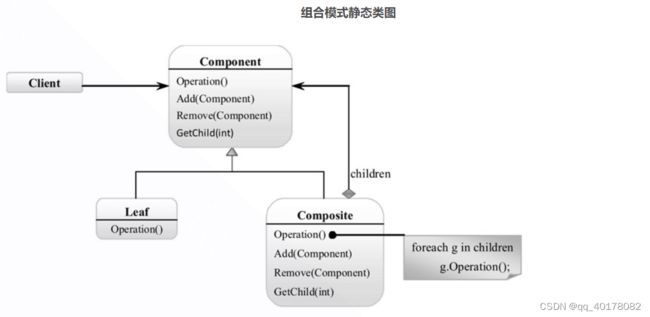- 【iOS】MVC设计模式
Magnetic_h
iosmvc设计模式objective-c学习ui
MVC前言如何设计一个程序的结构,这是一门专门的学问,叫做"架构模式"(architecturalpattern),属于编程的方法论。MVC模式就是架构模式的一种。它是Apple官方推荐的App开发架构,也是一般开发者最先遇到、最经典的架构。MVC各层controller层Controller/ViewController/VC(控制器)负责协调Model和View,处理大部分逻辑它将数据从Mod
- 【一起学Rust | 设计模式】习惯语法——使用借用类型作为参数、格式化拼接字符串、构造函数
广龙宇
一起学Rust#Rust设计模式rust设计模式开发语言
提示:文章写完后,目录可以自动生成,如何生成可参考右边的帮助文档文章目录前言一、使用借用类型作为参数二、格式化拼接字符串三、使用构造函数总结前言Rust不是传统的面向对象编程语言,它的所有特性,使其独一无二。因此,学习特定于Rust的设计模式是必要的。本系列文章为作者学习《Rust设计模式》的学习笔记以及自己的见解。因此,本系列文章的结构也与此书的结构相同(后续可能会调成结构),基本上分为三个部分
- JAVA学习笔记之23种设计模式学习
victorfreedom
Java技术设计模式androidjava常用设计模式
博主最近买了《设计模式》这本书来学习,无奈这本书是以C++语言为基础进行说明,整个学习流程下来效率不是很高,虽然有的设计模式通俗易懂,但感觉还是没有充分的掌握了所有的设计模式。于是博主百度了一番,发现有大神写过了这方面的问题,于是博主迅速拿来学习。一、设计模式的分类总体来说设计模式分为三大类:创建型模式,共五种:工厂方法模式、抽象工厂模式、单例模式、建造者模式、原型模式。结构型模式,共七种:适配器
- 设计模式之建造者模式(通俗易懂--代码辅助理解【Java版】)
ok!ko
设计模式设计模式建造者模式java
文章目录设计模式概述1、建造者模式2、建造者模式使用场景3、优点4、缺点5、主要角色6、代码示例:1)实现要求2)UML图3)实现步骤:1)创建一个表示食物条目和食物包装的接口2)创建实现Packing接口的实体类3)创建实现Item接口的抽象类,该类提供了默认的功能4)创建扩展了Burger和ColdDrink的实体类5)创建一个Meal类,带有上面定义的Item对象6)创建一个MealBuil
- 设计模式 23 访问者模式
WineMonk
#设计模式设计模式访问者模式
设计模式23创建型模式(5):工厂方法模式、抽象工厂模式、单例模式、建造者模式、原型模式结构型模式(7):适配器模式、桥接模式、组合模式、装饰者模式、外观模式、享元模式、代理模式行为型模式(11):责任链模式、命令模式、解释器模式、迭代器模式、中介者模式、备忘录模式、观察者模式、状态模式、策略模式、模板方法模式、访问者模式文章目录设计模式23访问者模式(VisitorPattern)1定义2结构3
- 设计模式】Listener模式和Visitor模式的区别
不爱洗脚的小滕
设计模式访问者模式javagolang
文章目录前言一、介绍Listener模式Visitor模式二、代码实现2.1Listener模式的Java实现2.2Listener模式的Go实现2.3Visitor模式的Java实现2.4Visitor模式的Go实现三、总结前言在软件设计中,设计模式是解决特定问题的通用解决方案。Listener模式和Visitor模式是两种常见的行为设计模式,它们在不同的场景下提供了解决问题的有效方法。本文将详
- 开发游戏的学习规划
杰克逊的日记
游戏学习
第一阶段:●C#语言快速系统地学习一遍(基础的语法、面向对象、基础的数据结构、基础的设计模式)●Unity的2D和3D部分及UI、动画、物理系统●阶段性测验:需要去用前面所学的这些基础知识来完成一个简单的2d或者3d的案例,将通过一个自制的《Flappybird》游戏案例讲解游戏开发的思想及方法,并将《Flappybird》这个游戏进一步改造成一个横版射击类游戏《Crazybird》以巩固并且升华
- 从单体到微服务:FastAPI ‘挂载’子应用程序的转变
黑金IT
fastapi微服务fastapi架构
在现代Web应用开发中,模块化架构是一种常见的设计模式,它有助于将大型应用程序分解为更小、更易于管理的部分。FastAPI,作为一个高性能的PythonWeb框架,提供了强大的支持来实现这种模块化设计。通过“挂载”子应用程序,我们可以为不同的功能区域(如前端接口、管理员接口和用户中心)创建独立的应用程序,并将它们整合到一个主应用程序中。本文将详细介绍如何在FastAPI中使用“挂载”子应用程序的方
- [面试高频问题]关于多线程的单例模式
朱玥玥要每天学习
java单例模式开发语言
单例模式什么是设计模式?设计模式可以看做为框架或者是围棋中的”棋谱”,红方当头炮,黑方马来跳.根据一些固定的套路下,能保证局势不会吃亏.在日常的程序设计中,往往有许多业务场景,根据这些场景,大佬们总结出了一些固定的套路.按照这个套路来实现代码,也不会吃亏.什么是单例模式,保证某类在程序中只有一个实例,而不会创建多份实例.单例模式具体的实现方式:可分为”懒汉模式”,”饿汉模式”.饿汉模式类加载的同时
- 从简单到复杂:三种工厂模式的对比与应用
技术拾光者
设计模式java设计模式简单工厂模式抽象工厂模式工厂方法模式
在软件设计中,创建型设计模式用于处理对象创建的复杂性。本文将对比三种常见的创建型设计模式:简单工厂模式、工厂方法模式和抽象工厂模式。一,简单工厂模式定义:简单工厂模式(SimpleFactoryPattern)定义了一个工厂类,该类可以根据传入的参数决定创建哪一种产品实例。结构:产品(Product):定义产品的接口。具体产品(ConcreteProduct):实现具体产品。工厂(Factory)
- 当前最流行的架构设计模式
turingbooks
《微服务设计(第2版)》最可贵的地方在于,不光具备理论性与系统性,更为注重实践性与可操作性。全书勾勒出一幅从宏观到细节,再到组织落地的微服务架构整体实施蓝图。无论是对关注微服务领域的工程师与架构师,还是对寻求架构升级的管理者与决策者来说,本书都可以作为指导手册。——沈剑,快狗打车CTO《微服务设计(第2版)》萨姆·纽曼|著钟健鑫张沙沙智伟|译软件开发大神MartinFowler如此推荐本书:“微服
- 互联网 Java 工程师面试题(Java 面试题四)
苹果酱0567
面试题汇总与解析java中间件开发语言springboot后端
下面列出这份Java面试问题列表包含的主题多线程,并发及线程基础数据类型转换的基本原则垃圾回收(GC)Java集合框架数组字符串GOF设计模式SOLID抽象类与接口Java基础,如equals和hashcode泛型与枚举JavaIO与NIO常用网络协议Java中的数据结构和算法正则表达式JVM底层Java最佳实JDBCDate,Time与CalendarJava处理XMLJUnit编程现在是时候给
- 《Android进阶之光》— Android 书籍
王睿丶
Android永无止境《Android进阶之光》Android书籍Androidphoenix移动开发
文章目录第1章Android新特性1第2章MaterialDesign48第3章View体系与自定义View87第4章多线程编程165第5章网络编程与网络框架204第6章设计模式271第7章事件总线308第8章函数响应式编程333第9章注解与依赖注入框架382第10章应用架构设计422第11章系统架构与MediaPlayer框架460出版年:2017-7简介:《Android进阶之光》是一本And
- MyBatis 方法重载的陷阱及解决方案
molashaonian
mybatis方法重载异常方法名相同
在使用MyBatis进行开发时,尤其是使用注解模式(如@Select、@Insert等)时,开发者常常会遇到这样一个问题:为什么我的方法重载不能正常工作?即使在Java中允许方法名相同但参数不同的重载,MyBatis在处理注解的SQL方法时却并不支持这种方式。这篇文章将深入探讨MyBatis的这个特性及如何规避相关的坑。问题背景在标准的Java开发中,方法重载是一种常见的设计模式。方法重载允许我们
- 【设计模式】结构型模式:组合模式
KunQAQrz
意图使用组合模式可以将对象组合成树状结构,并且能像使用独立对象一样使用它们。组合模式结构在这里插入图片描述组件(Component)接口描述了树中简单项目和复杂项目所共有的操作。叶节点(Leaf)是树的基本结构,它不包含子项目。一般情况下,叶节点最终会完成大部分的实际工作,因为它们无法将工作指派给其他部分。容器(Container)又名“组合(Composite)”是包含叶节点或其他容器等子项目的
- Java高并发编程详解系列-Balking设计模式
nihui123
高并发设计模式java编程语言
导语 在实际操作中当某个线程因为发现其他线程正在进行相同的工作而放弃即将开始的任务,这种情况就被称为是Balking模式,Balking英文的意思是犹豫。在多个线程监控某个共享变量,A线程监控到共享变量发生变化后立即触发某个动作,但是这个这个时候发现了B线程也对该变量开始了行动,这个时候A变量就放弃了准备工作。下面就来详细的讲解一下关于Balking模式什么是Balking模式 在餐厅吃饭的时
- Java高并发编程详解系列-Future设计模式
nihui123
高并发Java高并发Future高并发
导语 假设,在一个使用场景中有一个任务需要执行比较长的时间,通常需要等待任务执行结束之后或者是中途出错之后才能返回结果。在这个期间调用者只能等待,对于这个结果Future设计模式提供了一种凭据式的解决方案。在日常生活中,这种方案也是存在的。例如去洗衣店洗衣服,当你把衣服放到洗衣店,等他洗完需要一段时间,这个时候洗衣店就会给你一凭证,你可以通过这个凭证到时候去取洗好的衣服。这个例子就是生活中的Fu
- 字节跳动面试官亲述:Android开发学会了这些技术,你离大厂不远了
m0_65322636
程序员架构移动开发android
HTTPSHTTP是超文本传输协议,明文传输;HTTPS使用SSL协议对HTTP传输数据进行了加密HTTP默认80端口;HTTPS默认443端口优点:安全缺点:费时、SSL证书收费,加密能力还是有限的,但是比HTTP强多了2、Java基础&容器&同步&设计模式StringBuilder、StringBuffer、+、String.concat链接字符串:StringBuffer线程安全,Strin
- 生产者消费者模式_Labview基础之生产者消费者设计模式(事件)
weixin_39532699
生产者消费者模式
1绪论近期,开了一个QQ群,刚开始的目的也是想多拉写软件相关的大神,有问题的时候也可以交流交流。记得当时有个软件在写的时候遇到了一个棘手的问题,outlook邮箱配置账户密码的问题,到现在也没解决,算了,也不是很迫切。2000人群就留在那里爬虫发单吧!建群以后才发现,原来这一块的小白还挺多,总结起来就一个原因:做这个软件的大多数都不是软件出生,都是因为临时要搭建一个上位机平台,匆匆入门......
- 案例分析:如何用设计模式优化性能7
是小旭啊
fastapi
设计模式就是对常用开发技巧进行的总结,它使得程序员之间交流问题,有了更专业、便捷的方式。比如,我们在《02|理论分析:性能优化有章可循,谈谈常用的切入点》中提到,I/O模块使用的是装饰器模式,你就能很容易想到I/O模块的代码组织方式。事实上,大多数设计模式并不能增加程序的性能,它只是代码的一种组织方式。本课时,我们将一一举例讲解和性能相关的几个设计模式,包括代理模式、单例模式、享元模式、原型模式等
- 重修设计模式-结构型-代理模式
丶白泽
重修设计模式设计模式代理模式系统安全
重修设计模式-结构型-代理模式在不改变原始类代码的情况下,通过引入代理类来给原始类附加功能。代理模式通过创建一个代理对象,使得客户端对目标对象的访问都通过代理对象间接进行,从而可以在不修改目标对象的前提下,增加额外的功能操作,如权限控制、日志记录、事务处理等。代理模式又分为静态代理和动态代理。静态代理(StaticProxy):在程序运行前就已经存在代理类的字节码文件,代理类和委托类的关系在运行前
- 如何利用命令模式实现一个手游后端架构?
隔窗听雨眠
命令模式
命令模式的原理解读命令模式的英文翻译是CommandDesignPattern。在GoF的《设计模式》一书中,它是这么定义的:Thecommandpatternencapsulatesarequestasanobject,therebylettingusparameterizeotherobjectswithdifferentrequests,queueorlogrequests,andsuppo
- 单例模式以及反射对单例模式的破坏及防御
CodeDunkster
单例模式javajavascript
单例模式(SingletonPattern)是一种确保类在应用程序生命周期内只存在一个实例的设计模式。它不仅提供了全局访问点,还能节省内存、控制实例的生命周期。但常见的单例模式实现方式如饿汉式、懒汉式、双重校验锁、静态内部类等,虽然设计良好,但都容易被Java的反射机制所破坏。本文将介绍这些单例实现方式的优缺点、反射如何破坏它们的唯一性,以及如何防御这种破坏。1.单例模式的常见实现方式1.1饿汉式
- Koa2 的洋葱模型是什么?它是如何实现的?
极客李华
Koakoa
Koa2的洋葱模型是什么?它是如何实现的?Koa2的洋葱模型是一种中间件执行流程的设计模式,它允许开发者在请求的处理过程中,按照特定的顺序依次执行一系列中间件函数。洋葱模型的实现基于Koa2框架的特性和原理。下面我将通过一个具体的案例来解释洋葱模型的概念和实现。假设我们有一个简单的Koa2应用,用于处理用户的HTTP请求。首先,我们需要创建一个Koa应用实例:constKoa=require('k
- 设计模式-单例模式
SAO&asuna
设计模式学习设计模式单例模式开发语言
文章目录1.为什么要学习单例模式2.单例模式的类型2.1饿汉式单例2.2懒汉式单例2.2.1一般实现2.2.2sync.once实现2.2.3sync.Mutex实现2.2.4原子引用2.2.5极致性能优化3单例模式的优缺点1.为什么要学习单例模式单例模式,就是在整个进程的过程中,只会存在一个实例。这样做的好处主要是两个:访问控制:访问控制也就是只有这一个口子可以得到该实例,一般是通过全局变量达到
- 深入解析C++单例模式:从基础到线程安全的高效实现
shuai_258
c++全套攻略c++c++多线程开发语言c++qt
引言在C++开发中,单例模式(SingletonPattern)是一种常见且重要的设计模式。它确保类的实例在整个程序生命周期中唯一,并提供一个全局访问点。这在日志管理、配置管理等场景中尤为常见。本篇博客将带你深入了解单例模式的实现原理,并介绍如何在多线程环境下实现线程安全的单例模式。什么是单例模式?单例模式是一种设计模式,其核心思想是确保某个类只能有一个实例,并提供一个全局的访问点。其应用场景包括
- 漫谈设计模式 [17]:状态模式
AI让世界更懂你
设计模式状态模式python
引导性开场菜鸟:老鸟,我最近在写一个项目,遇到一个问题。我们有一个订单系统,不同的订单状态需要执行不同的操作。现在代码里充满了各种if-else语句,维护起来好痛苦。有没有什么好的解决办法?老鸟:你这个问题很常见,很多人都会遇到类似的痛点。你有没有听说过状态模式?菜鸟:状态模式?好像听过,但不太了解。老鸟:没关系,我们可以一步步来。先讲讲你现在的实现方式吧。渐进式介绍概念菜鸟:好的,我现在是这样写
- Java基础 --- 多线程&JUC,以及一些常用的设计模式总结
lzhlizihang
java设计模式
文章目录一、多线程1、线程和进程的区别2、创建多线程的四种方式3、集合中的线程安全二、设计模式1、单例模式2、装饰者模式(IO流缓冲流)3、适配器模式4、模板模式一、多线程1、线程和进程的区别进程是操作系统资源分配的基本单位,而线程是处理器任务调度和执行的基本单位,一个进程可以运行多个线程多进程:操作系统中同时运行的多个程序多线程:在同一个进程中同时运行的多个任务2、创建多线程的四种方式Runna
- 【系统架构设计师】解释器模式
Evaporator Core
解释器模式python开发语言
解释器模式(InterpreterPattern)是一种行为型设计模式,它定义了文法的表示,并定义了一个解释器,该解释器使用该表示来解释语言中的句子。在解释器模式中,通常包括一个抽象语法树(AbstractSyntaxTree,AST),用于表示输入的语言文法,以及一系列的解释器类,每个类对应文法中的一个符号或符号的组合。解释器模式主要适用于那些需要将一个语言中的句子解释成程序可以理解的另一种形式
- 设计模式-分离接口(Separated Interface)
workflower
设计方法设计模式课程设计设计规范开发语言软件需求
在一个包中定义接口,而在另一个包中实现这个接口,两个包是分离的。背景为了减少部件之间的耦合程度改进设计质量,可以将类分组并组织成包,并限定包之间的依赖关系。但有时可能需要调用与包之间一般性依赖关系有冲突的方法,此时可以在一个包中定义接口,在另一个包中实现它。运行机制核心思想利用了:实现类对接口存在依赖关系,反之不然。其他包可以只依赖于接口包,而与实现包没有依赖关系。可以采用独立的包将接口与实现链接
- Linux的Initrd机制
被触发
linux
Linux 的 initrd 技术是一个非常普遍使用的机制,linux2.6 内核的 initrd 的文件格式由原来的文件系统镜像文件转变成了 cpio 格式,变化不仅反映在文件格式上, linux 内核对这两种格式的 initrd 的处理有着截然的不同。本文首先介绍了什么是 initrd 技术,然后分别介绍了 Linux2.4 内核和 2.6 内核的 initrd 的处理流程。最后通过对 Lin
- maven本地仓库路径修改
bitcarter
maven
默认maven本地仓库路径:C:\Users\Administrator\.m2
修改maven本地仓库路径方法:
1.打开E:\maven\apache-maven-2.2.1\conf\settings.xml
2.找到
- XSD和XML中的命名空间
darrenzhu
xmlxsdschemanamespace命名空间
http://www.360doc.com/content/12/0418/10/9437165_204585479.shtml
http://blog.csdn.net/wanghuan203/article/details/9203621
http://blog.csdn.net/wanghuan203/article/details/9204337
http://www.cn
- Java 求素数运算
周凡杨
java算法素数
网络上对求素数之解数不胜数,我在此总结归纳一下,同时对一些编码,加以改进,效率有成倍热提高。
第一种:
原理: 6N(+-)1法 任何一个自然数,总可以表示成为如下的形式之一: 6N,6N+1,6N+2,6N+3,6N+4,6N+5 (N=0,1,2,…)
- java 单例模式
g21121
java
想必单例模式大家都不会陌生,有如下两种方式来实现单例模式:
class Singleton {
private static Singleton instance=new Singleton();
private Singleton(){}
static Singleton getInstance() {
return instance;
}
- Linux下Mysql源码安装
510888780
mysql
1.假设已经有mysql-5.6.23-linux-glibc2.5-x86_64.tar.gz
(1)创建mysql的安装目录及数据库存放目录
解压缩下载的源码包,目录结构,特殊指定的目录除外:
- 32位和64位操作系统
墙头上一根草
32位和64位操作系统
32位和64位操作系统是指:CPU一次处理数据的能力是32位还是64位。现在市场上的CPU一般都是64位的,但是这些CPU并不是真正意义上的64 位CPU,里面依然保留了大部分32位的技术,只是进行了部分64位的改进。32位和64位的区别还涉及了内存的寻址方面,32位系统的最大寻址空间是2 的32次方= 4294967296(bit)= 4(GB)左右,而64位系统的最大寻址空间的寻址空间则达到了
- 我的spring学习笔记10-轻量级_Spring框架
aijuans
Spring 3
一、问题提问:
→ 请简单介绍一下什么是轻量级?
轻量级(Leightweight)是相对于一些重量级的容器来说的,比如Spring的核心是一个轻量级的容器,Spring的核心包在文件容量上只有不到1M大小,使用Spring核心包所需要的资源也是很少的,您甚至可以在小型设备中使用Spring。
- mongodb 环境搭建及简单CURD
antlove
WebInstallcurdNoSQLmongo
一 搭建mongodb环境
1. 在mongo官网下载mongodb
2. 在本地创建目录 "D:\Program Files\mongodb-win32-i386-2.6.4\data\db"
3. 运行mongodb服务 [mongod.exe --dbpath "D:\Program Files\mongodb-win32-i386-2.6.4\data\
- 数据字典和动态视图
百合不是茶
oracle数据字典动态视图系统和对象权限
数据字典(data dictionary)是 Oracle 数据库的一个重要组成部分,这是一组用于记录数据库信息的只读(read-only)表。随着数据库的启动而启动,数据库关闭时数据字典也关闭 数据字典中包含
数据库中所有方案对象(schema object)的定义(包括表,视图,索引,簇,同义词,序列,过程,函数,包,触发器等等)
数据库为一
- 多线程编程一般规则
bijian1013
javathread多线程java多线程
如果两个工两个以上的线程都修改一个对象,那么把执行修改的方法定义为被同步的,如果对象更新影响到只读方法,那么只读方法也要定义成同步的。
不要滥用同步。如果在一个对象内的不同的方法访问的不是同一个数据,就不要将方法设置为synchronized的。
- 将文件或目录拷贝到另一个Linux系统的命令scp
bijian1013
linuxunixscp
一.功能说明 scp就是security copy,用于将文件或者目录从一个Linux系统拷贝到另一个Linux系统下。scp传输数据用的是SSH协议,保证了数据传输的安全,其格式如下: scp 远程用户名@IP地址:文件的绝对路径
- 【持久化框架MyBatis3五】MyBatis3一对多关联查询
bit1129
Mybatis3
以教员和课程为例介绍一对多关联关系,在这里认为一个教员可以叫多门课程,而一门课程只有1个教员教,这种关系在实际中不太常见,通过教员和课程是多对多的关系。
示例数据:
地址表:
CREATE TABLE ADDRESSES
(
ADDR_ID INT(11) NOT NULL AUTO_INCREMENT,
STREET VAR
- cookie状态判断引发的查找问题
bitcarter
formcgi
先说一下我们的业务背景:
1.前台将图片和文本通过form表单提交到后台,图片我们都做了base64的编码,并且前台图片进行了压缩
2.form中action是一个cgi服务
3.后台cgi服务同时供PC,H5,APP
4.后台cgi中调用公共的cookie状态判断方法(公共的,大家都用,几年了没有问题)
问题:(折腾两天。。。。)
1.PC端cgi服务正常调用,cookie判断没
- 通过Nginx,Tomcat访问日志(access log)记录请求耗时
ronin47
一、Nginx通过$upstream_response_time $request_time统计请求和后台服务响应时间
nginx.conf使用配置方式:
log_format main '$remote_addr - $remote_user [$time_local] "$request" ''$status $body_bytes_sent "$http_r
- java-67- n个骰子的点数。 把n个骰子扔在地上,所有骰子朝上一面的点数之和为S。输入n,打印出S的所有可能的值出现的概率。
bylijinnan
java
public class ProbabilityOfDice {
/**
* Q67 n个骰子的点数
* 把n个骰子扔在地上,所有骰子朝上一面的点数之和为S。输入n,打印出S的所有可能的值出现的概率。
* 在以下求解过程中,我们把骰子看作是有序的。
* 例如当n=2时,我们认为(1,2)和(2,1)是两种不同的情况
*/
private stati
- 看别人的博客,觉得心情很好
Cb123456
博客心情
以为写博客,就是总结,就和日记一样吧,同时也在督促自己。今天看了好长时间博客:
职业规划:
http://www.iteye.com/blogs/subjects/zhiyeguihua
android学习:
1.http://byandby.i
- [JWFD开源工作流]尝试用原生代码引擎实现循环反馈拓扑分析
comsci
工作流
我们已经不满足于仅仅跳跃一次,通过对引擎的升级,今天我测试了一下循环反馈模式,大概跑了200圈,引擎报一个溢出错误
在一个流程图的结束节点中嵌入一段方程,每次引擎运行到这个节点的时候,通过实时编译器GM模块,计算这个方程,计算结果与预设值进行比较,符合条件则跳跃到开始节点,继续新一轮拓扑分析,直到遇到
- JS常用的事件及方法
cwqcwqmax9
js
事件 描述
onactivate 当对象设置为活动元素时触发。
onafterupdate 当成功更新数据源对象中的关联对象后在数据绑定对象上触发。
onbeforeactivate 对象要被设置为当前元素前立即触发。
onbeforecut 当选中区从文档中删除之前在源对象触发。
onbeforedeactivate 在 activeElement 从当前对象变为父文档其它对象之前立即
- 正则表达式验证日期格式
dashuaifu
正则表达式IT其它java其它
正则表达式验证日期格式
function isDate(d){
var v = d.match(/^(\d{4})-(\d{1,2})-(\d{1,2})$/i);
if(!v) {
this.focus();
return false;
}
}
<input value="2000-8-8" onblu
- Yii CModel.rules() 方法 、validate预定义完整列表、以及说说验证
dcj3sjt126com
yii
public array rules () {return} array 要调用 validate() 时应用的有效性规则。 返回属性的有效性规则。声明验证规则,应重写此方法。 每个规则是数组具有以下结构:array('attribute list', 'validator name', 'on'=>'scenario name', ...validation
- UITextAttributeTextColor = deprecated in iOS 7.0
dcj3sjt126com
ios
In this lesson we used the key "UITextAttributeTextColor" to change the color of the UINavigationBar appearance to white. This prompts a warning "first deprecated in iOS 7.0."
Ins
- 判断一个数是质数的几种方法
EmmaZhao
Mathpython
质数也叫素数,是只能被1和它本身整除的正整数,最小的质数是2,目前发现的最大的质数是p=2^57885161-1【注1】。
判断一个数是质数的最简单的方法如下:
def isPrime1(n):
for i in range(2, n):
if n % i == 0:
return False
return True
但是在上面的方法中有一些冗余的计算,所以
- SpringSecurity工作原理小解读
坏我一锅粥
SpringSecurity
SecurityContextPersistenceFilter
ConcurrentSessionFilter
WebAsyncManagerIntegrationFilter
HeaderWriterFilter
CsrfFilter
LogoutFilter
Use
- JS实现自适应宽度的Tag切换
ini
JavaScripthtmlWebcsshtml5
效果体验:http://hovertree.com/texiao/js/3.htm
该效果使用纯JavaScript代码,实现TAB页切换效果,TAB标签根据内容自适应宽度,点击TAB标签切换内容页。
HTML文件代码:
<!DOCTYPE html>
<html xmlns="http://www.w3.org/1999/xhtml"
- Hbase Rest API : 数据查询
kane_xie
RESThbase
hbase(hadoop)是用java编写的,有些语言(例如python)能够对它提供良好的支持,但也有很多语言使用起来并不是那么方便,比如c#只能通过thrift访问。Rest就能很好的解决这个问题。Hbase的org.apache.hadoop.hbase.rest包提供了rest接口,它内嵌了jetty作为servlet容器。
启动命令:./bin/hbase rest s
- JQuery实现鼠标拖动元素移动位置(源码+注释)
明子健
jqueryjs源码拖动鼠标
欢迎讨论指正!
print.html代码:
<!DOCTYPE html>
<html>
<head>
<meta http-equiv=Content-Type content="text/html;charset=utf-8">
<title>发票打印</title>
&l
- Postgresql 连表更新字段语法 update
qifeifei
PostgreSQL
下面这段sql本来目的是想更新条件下的数据,可是这段sql却更新了整个表的数据。sql如下:
UPDATE tops_visa.visa_order
SET op_audit_abort_pass_date = now()
FROM
tops_visa.visa_order as t1
INNER JOIN tops_visa.visa_visitor as t2
ON t1.
- 将redis,memcache结合使用的方案?
tcrct
rediscache
公司架构上使用了阿里云的服务,由于阿里的kvstore收费相当高,打算自建,自建后就需要自己维护,所以就有了一个想法,针对kvstore(redis)及ocs(memcache)的特点,想自己开发一个cache层,将需要用到list,set,map等redis方法的继续使用redis来完成,将整条记录放在memcache下,即findbyid,save等时就memcache,其它就对应使用redi
- 开发中遇到的诡异的bug
wudixiaotie
bug
今天我们服务器组遇到个问题:
我们的服务是从Kafka里面取出数据,然后把offset存储到ssdb中,每个topic和partition都对应ssdb中不同的key,服务启动之后,每次kafka数据更新我们这边收到消息,然后存储之后就发现ssdb的值偶尔是-2,这就奇怪了,最开始我们是在代码中打印存储的日志,发现没什么问题,后来去查看ssdb的日志,才发现里面每次set的时候都会对同一个key

